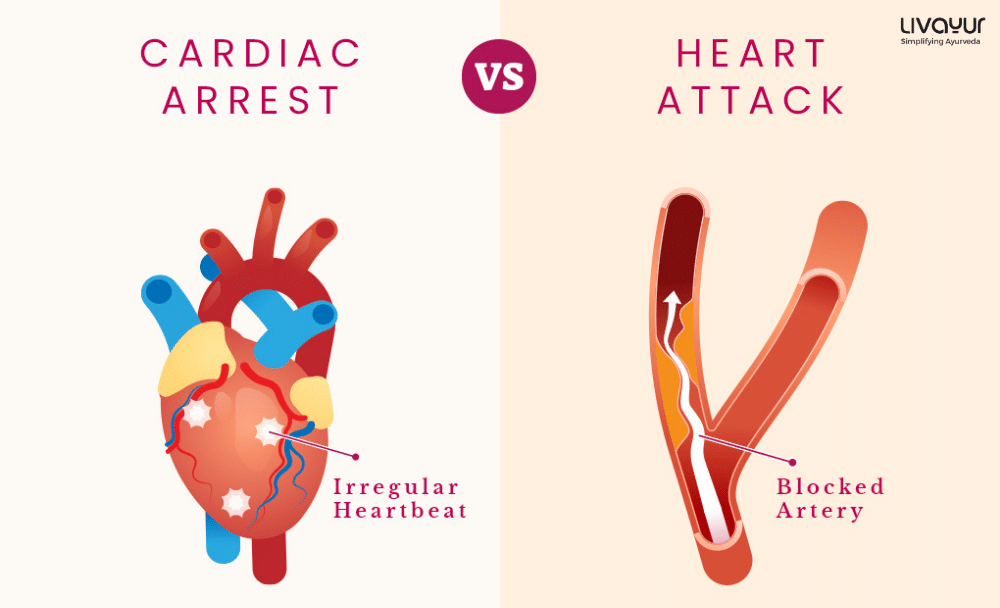
“पुनर्वित्तं पुनर्मित्रं पुनर्भार्या पुनर्मही।
एतत्सर्वं पुनर्लभ्यं न शरीरं पुनः पुनः।।”
Punavirtt punmitr punbhorya punmarhe
Ayttsva punrlbhya na sharir punna punna
Regaining a wife, kingdom, friend, and money is possible in life. Your body is the one thing you can never get back. Your body and health can never fully recover once they are gone. As a result, it’s critical to regularly take care of your body.
Heart attack is a common term that most people know and understand, but do you know what is a cardiac arrest? A cardiac arrest is a life-threatening medical emergency that can happen suddenly and without any warning signs. It occurs when the heart’s electrical system malfunctions, causing the heart to stop beating properly. This can lead to a sudden loss of consciousness and, if left untreated, can result in death within minutes.
In Ayurveda, the promotion of health and prevention of diseases is given more importance than the treatment of the diseases. Health and diseases are dependent on three factors i.e. Ahara (Diet), Vihara (lifestyle practices) & Oushadha (Drug & therapies). Among these, food (Ahara) is considered the most important. Pathya is defined as the Ahara which is congenial to a person according to his constitution, appetite & digestive capacity of the body. Most health problems develop due to wrong eating and improper cooking.
Understanding what is cardiac arrest, its causes, symptoms, treatment, and prevention is crucial for individuals to take appropriate actions and for healthcare providers to provide timely and effective care. In this article, we will explore the meaning and causes of cardiac arrest, as well as the symptoms, treatment, and prevention strategies to manage this serious medical condition. We will also discuss the differences between cardiac arrest and heart attack and highlight the importance of knowing how to respond to a cardiac emergency.
Cardiac Arrest Meaning and Types
Cardiac arrest occurs when the heart suddenly stops beating, leading to the cessation of blood flow to the brain and other vital organs [1]. The term “cardiac arrest” is often used interchangeably with “sudden cardiac arrest” or “sudden cardiac death.”
Types of Cardiac Arrest
Cardiac arrest can be broadly classified into two types – ventricular fibrillation and pulseless ventricular tachycardia [2].
- Ventricular fibrillation occurs when the heart’s electrical activity becomes chaotic, leading to a rapid and irregular heartbeat.
- Ventricular tachycardia (pumpless) occurs when the heart’s electrical activity becomes too fast, leading to a rapid heartbeat that does not allow for the effective pumping of blood [2].
Cardiac Arrest vs Heart Attack

It is important to distinguish between cardiac arrest and a heart attack, as they are two different medical emergencies. A heart attack occurs when blood flow to the heart is blocked, leading to damage to the heart muscle. However, a heart attack does not necessarily lead to cardiac arrest [3]. Cardiac arrest, on the other hand, is caused by an electrical malfunction in the heart and can occur even in the absence of a heart attack.
Causes of Cardiac Arrest
Cardiac arrest can have several causes, including underlying heart conditions such as coronary artery disease, heart failure, and arrhythmias [4]. Other factors that can be a cause of cardiac arrest include:
- Smoking
- Drug abuse
- Obesity
- A sedentary lifestyle
In some cases, cardiac arrest can also be triggered by external factors such as electrocution, drowning, or trauma to the chest [5].
Symptoms of Cardiac Arrest
Cardiac arrest can occur suddenly and without any prior symptoms or warning signs. However, in some cases, there may be warning signs such as:
- Chest pain
- Shortness of breath
- Fainting [6]
If you or someone you know is experiencing these symptoms, it is important to seek medical attention immediately.
Diagnosis of Cardiac Arrest
Sudden cardiac arrest requires immediate medical attention. There are chances of survival if the heart is restored quickly. Medical professionals will perform tests like ECG, chest x-ray, and nuclear scan to identify the problem after you are stable.
Treatment for Cardiac Arrest
Cardiac arrest is a medical emergency that requires immediate treatment. The first step of cardiac arrest treatment is to perform cardiopulmonary resuscitation (CPR) to maintain blood flow to the brain and other vital organs until medical help arrives [7]. In addition to CPR, defibrillation is also used to treat cardiac arrest. Defibrillation involves the use of an electric shock to restore the heart’s normal rhythm [8]. Other cardiac arrest treatments may include medication and implantable devices such as pacemakers and defibrillators.
Cardiac Arrest Prevention

Preventing cardiac arrest involves managing underlying health conditions and making lifestyle changes to reduce the risk of heart disease. This includes:
- Maintaining a healthy weight
- Quitting smoking
- Getting regular exercise
- Managing stress [9]
It is also important to have regular check-ups with a healthcare provider to monitor your heart health and address any underlying conditions.
In conclusion, cardiac arrest is a life-threatening medical emergency that can occur suddenly and without any warning signs. It is important to distinguish between cardiac arrest and a heart attack and to seek medical attention immediately if you or someone you know is experiencing symptoms of cardiac arrest. By managing underlying health conditions and making lifestyle changes, it is possible to reduce the risk of cardiac arrest. Treatments for cardiac arrest include CPR, defibrillation, medications, and implantable devices such as pacemakers and defibrillators. It is crucial to act quickly and get medical help as soon as possible to increase the chances of survival.
In addition to managing underlying health conditions and making lifestyle changes, it is important to be aware of the risk factors for cardiac arrest. This includes a family history of heart disease, a previous heart attack or stroke, high blood pressure, high cholesterol, and diabetes. If you have any of these risk factors, it is important to discuss them with your healthcare provider to develop a plan to reduce your risk.
In conclusion, cardiac arrest is a serious medical emergency that can occur suddenly and without any warning signs. It is important to know the causes, symptoms, and treatments for cardiac arrest, as well as how to prevent it. By managing underlying health conditions, making lifestyle changes, and being aware of the risk factors, it is possible to reduce the risk of cardiac arrest and improve overall heart health.
FAQs
- How long does a cardiac arrest last?
Cardiac arrest can be critical if lasts longer than 8 minutes without CPR. Brain damage starts after just 5 minutes, hence CPR must be given right away.
2. Can you live from cardiac arrest?
A sudden cardiac arrest without treatment can lead to death. CPR is the emergency treatment for sudden cardiac arrest.
3. What is the critical time for cardiac arrest?
In case of a sudden heart attack, the first 5-7 minutes are very important.
4. How is cardiac arrest treated?
The immediate treatment for sudden cardiac arrest is CPR, even if it is not in the hospital. Once the patient is stable, medical professionals will run tests like ECG, Blood Tests, Chest X-ray and more to identify the cause.
References:
- https://www.heart.org/en/health-topics/cardiac-arrest/about-cardiac-arrest
- https://www.mayoclinic.org/diseases-conditions/ventricular-fibrillation/symptoms-causes/syc-20364523
- https://www.heart.org/en/health-topics/heart-attack/about-heart-attacks/know-the-difference-heart-attack-vs-cardiac-arrest
- https://my.clevelandclinic.org/health/diseases/17413-sudden-cardiac-arrest
- https://www.mayoclinic.org/diseases-conditions/cardiac-arrest/symptoms-causes/syc-20350668
- https://www.heart.org/en/health-topics/cardiopulmonary-resuscitation-cpr
- https://www.mayoclinic.org/tests-procedures/defibrillation/about/pac-20385061
- https://www.cdc.gov/heartdisease/cardiac-arrest.htm


















Wonderful work! That is the type of information that are supposed to be shared around the web. Shame on the search engines for not positioning this post upper! Come on over and talk over with my web site . Thanks =)